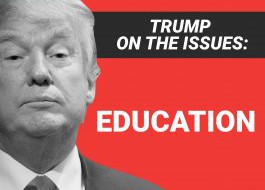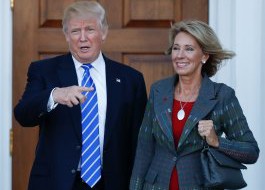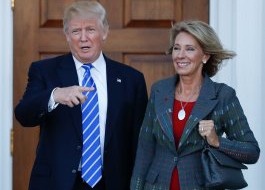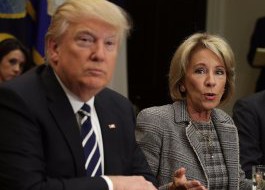
Michelle Rhee, former head of Washington, DC's public schools, and Betsy DeVos, chairwoman of the American Federation for Children, met with President-elect Trump at his golf course in Bedminster, New Jersey over the weekend. The meeting fueled speculation that one of the education stalwarts may become the next secretary of education.
The meeting with DeVos, a former chairman of the Michigan Republican Party and staunch school choice advocate, was likely unsurprising to education experts, as her positions align closely with Trump's.
But the meeting with Michelle Rhee, a Democrat whose major positions are at odds with those Trump put forth during his campaign, would be an unexpected cabinet member, and raises the question about the state of education policy will resemble under his presidency.
Common Core
During his campaign, Trump repeatedly blasted the Common Core State Standards. In a video he uploaded to Facebook in January, for example, Trump vowed to end the controversial nationwide education standards.
"Common Core's a total disaster," he said. "We're going to end Common Core."
He also frequently uses the Common Core — a set of nationwide education standards — as a launch point to talk about how poorly the US performs in education compared with other countries. "Common Core is out! It's out," he said at a rally in February.
"You have Norway, Sweden, Denmark, China, you have lots of places. You have some countries you've never even heard of are ahead of the USA," he continued, vowing to improve American education.
Rhee was at the helm in DC precisely when the Common Core Standards were created, and has remained a tireless proponent ever since.
In 2014, she went on Fox News to defend the standards and hit back at claims that adoption of the standards had yet to yield results.
"If you look at the states that have been implementing Common Core the earliest and the most aggressive places like here in Washington, DC, states like Tennessee, they are showing the largest gains on the NAEP examination which is the national gold standard test," she said on Fox.
School Choice
 Rhee is pro-charter, and recently switched her position on school vouchers.
Rhee is pro-charter, and recently switched her position on school vouchers.
In September, Trump pledged to immediately invest $20 billion in school choice. The move signaled that the polarizing issue of school vouchers would be the cornerstone of his education agenda.
Trump's plan would reprioritize existing federal dollars to establish a grant to allow children living in poverty to attend the school of their choice. Trump argued not only that the voucher system would help impoverished children enroll at quality schools, but also that a free market would improve the entire system.
Here, Rhee, who parts way with most others in her party on school choice, is closer to Trump. She is pro-charter school, and is currently chair of St. Hope Public Schools, a charter school in Sacramento, California. She also reversed her previous stance on school vouchers, throwing her support behind a measured version of the program.
Still, she made it clear she has great skepticism for overreaching voucher programs.
"When people talk about universal vouchers, first of all, I've never seen an economic model that actually made sense and laid that out in way that's sustainable," Rhee told Ed Week in 2012.
"There are a lot of people out there who sort of believe, the free market, let the free market reign, the market will correct itself—give every kid a backpack with their money in it and let them choose wherever they want to go," she said. "I don't believe in that model at all."
Immigration
 Donald Trump. Drew Angerer/Getty Images
Donald Trump. Drew Angerer/Getty Images
While immigration is more of a tangential issue in education policy, there are still serious implications for undocumented students and families living in the US.
Currently, about 3.9 million kindergarten through 12th-grade students in the US are children of unauthorized immigrants, according to Pew Research Center.
One of Trump's biggest issues during his campaign was his pledge to reform the immigration system and secure the boarder between Mexico and the US.
He also has said that he would rescind the Deferred Action for Childhood Arrivals, or DACA, an executive action ordered by President Obama in 2012. DACA allows certain undocumented immigrants who came to the US before their 16th birthday the exemption from deportation.
Rhee's position on immigration as it pertains to students again diverges from Trump's.
"Immigration is not my area of expertise, but I know that the current policy has implications for our education system and isn’t working for kids,” she wrote in 2011, according to Ed Week. “No child should be forced to live in the shadows and hide their identity, nor should any teacher or mentor have to cover up the truth.”
While, on most major policy issues Trump and Rhee disagree, there is one area where they seem to align: their contentious relationship with teachers' unions.
In 2010, Rhee ended teacher tenure in DC and fired more than 200 teachers. The impact has been lasting bitterness between Rhee and the unions.
Trump, too, has discord with teachers' unions. He has openly criticized the unions, pointing to their stance against school-choice policies.
"Our public schools have grown up in a competition-free zone, surrounded by a very high union wall," he wrote in his book "The America We Deserve." He continued:
"Why aren't we shocked at the results? After all, teachers' unions are motivated by the same desires that move the rest of us. With more than 85% of their soft-money donations going to Democrats, teachers' unions know they can count on the politician they back to take a strong stand against school choice."




